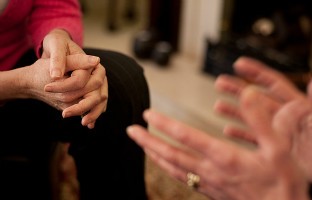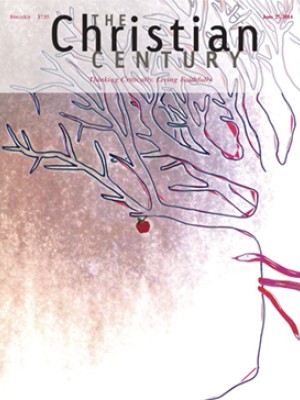Bisexual in the church: A source of disruptive conversation
I came out to myself as bisexual in my late forties. It was an intensely healing moment. Feelings of attraction to other women had confused and worried me for years, ever since a crush on a camp counselor in my teens. Throughout my loving, sustaining marriage with a man, I had occasionally felt a pull toward women. Now, in an instant of clarity, I was finally able to see myself the way God had known me all along: I am bi, capable of loving both men and women.
From that moment, peace settled in. It was easy to come out as bi to my husband, family, and friends, as well as to the congregation where I was a parish associate. Each echoed my husband’s immediate response: “That sounds about right as I know you.”
Read our latest issue or browse back issues.
Coming out to church colleagues was another matter. In the Presbyterian Church (U.S.A.), church membership for clergy means membership in a presbytery. The executive presbyter functions as our pastor. I had been in this presbytery for more than 20 years, so the executive presbyter and I knew each other fairly well. I made an appointment so that I could come out to him.
When I shared with him that I had come to understand that I am bisexual, he stopped me abruptly. He said he needed to warn me that there are limits to his ability to serve as my pastor. The PCUSA constitution invests his office with some important duties related to clergy discipline. If I confided to him about any violation of the church’s rules—including committing clear sins named in scripture—he was required to follow up with disciplinary measures.
Evidently, my executive presbyter took my coming out as bi to be a confession of serious sin. He wasn’t alone. I didn’t broadcast to my clergy colleagues that I’d come out, but the news got around. A conservative pastor I knew invited me to coffee. After we checked in about how things were going generally, he began to speak of his conviction that fidelity in marriage is an essential of Christian life. Promiscuity, he said, is an egregious violation of the seventh commandment.
I was confused. It took a moment for me to grasp what both he and the presbyter were trying to say to me. It wasn’t, apparently, same-sex attraction that worried them. They assumed that being bisexual meant I was being unfaithful to my husband. I assured them that I wasn’t. Now they were the ones who were confused.
It was a disruptive moment for me. It laid bare the chasm between how they saw LGBT people in the church and how I do. They thought I was revealing my sexual practice. In fact, for me coming out was about sharing a newly discovered and important facet of my identity as a child of God. Many in the LGBT community view coming out as a spiritual act. It’s an effort to integrate our spirituality and our sexuality, leading to wholeness.
Coming out to myself was one of the most transformative moments of my life. Aspects of my self-understanding that had been dissonant since my youth came into harmony for the first time. I had always assumed I was straight; my self-knowledge was distorted. When it finally sank in that the concept of bisexuality applies to me, it was as if my soul became clear, like a pond when the mud settles and you can see all the way to the bottom.
Sexual attraction is of course a component of my experience as bisexual. But it isn’t somehow more central to my sense of self, or to my interaction with others, than it is for straight people. One of the more unfortunate themes in the history of Christian thought is the bifurcation of body and soul—a tendency that has not nurtured a healthy integration of our whole selves. In my experience, being bisexual is about far more than just physical attraction. It’s about how—in my spirit—“both/and” comes more naturally into focus than “either/or” does. It’s about my whole identity as a child of God.
Our language has not been helpful here. Homosexuality entered English in the mid-19th century to describe what all considered to be an abnormality in sexual practice. Some still hold this view, even as the common understanding has moved toward recognizing a range of personal identity that is about much more than sexual practice. Younger generations keep expanding our understanding, so that “LGBT” no longer serves us well. Many prefer “lesbian, gay, bisexual, pansexual, transgender, transsexual, intersex and asexual.” Some self-identify as queer, a word they use to connote much more than sexual attraction. As for me, I prefer the term bi to bisexual because my identity as bi is not just about sex.
My two presbytery colleagues missed this. They also missed the related point that being bisexual doesn’t mean that I’m promiscuous, that it doesn’t by definition make me unfaithful to my husband. Hence their confusion when I assured them that fidelity is central to our wedding vows, and that I had not violated those vows nor had any intention to.
As far as I can see, the only difference between my faithfulness in marriage and anyone else’s is that I may be tempted by men and women alike. I exercise the same discipline of commitment that every married person does. But this was a new idea for my colleagues, making these conversations disruptive moments for these brothers in Christ as well as for me.
I am glad these disruptions led to transforming conversations. Transforming conversations are what the church so desperately needs—in order to see each person more deeply, to get closer to the way God sees each one of us.
This great need in the church for disruptive, transforming conversations is why, when it seems appropriate, I come out to people as simultaneously bisexual and faithfully married to a man. This continues to prompt disruptive moments of mutual transformation.






